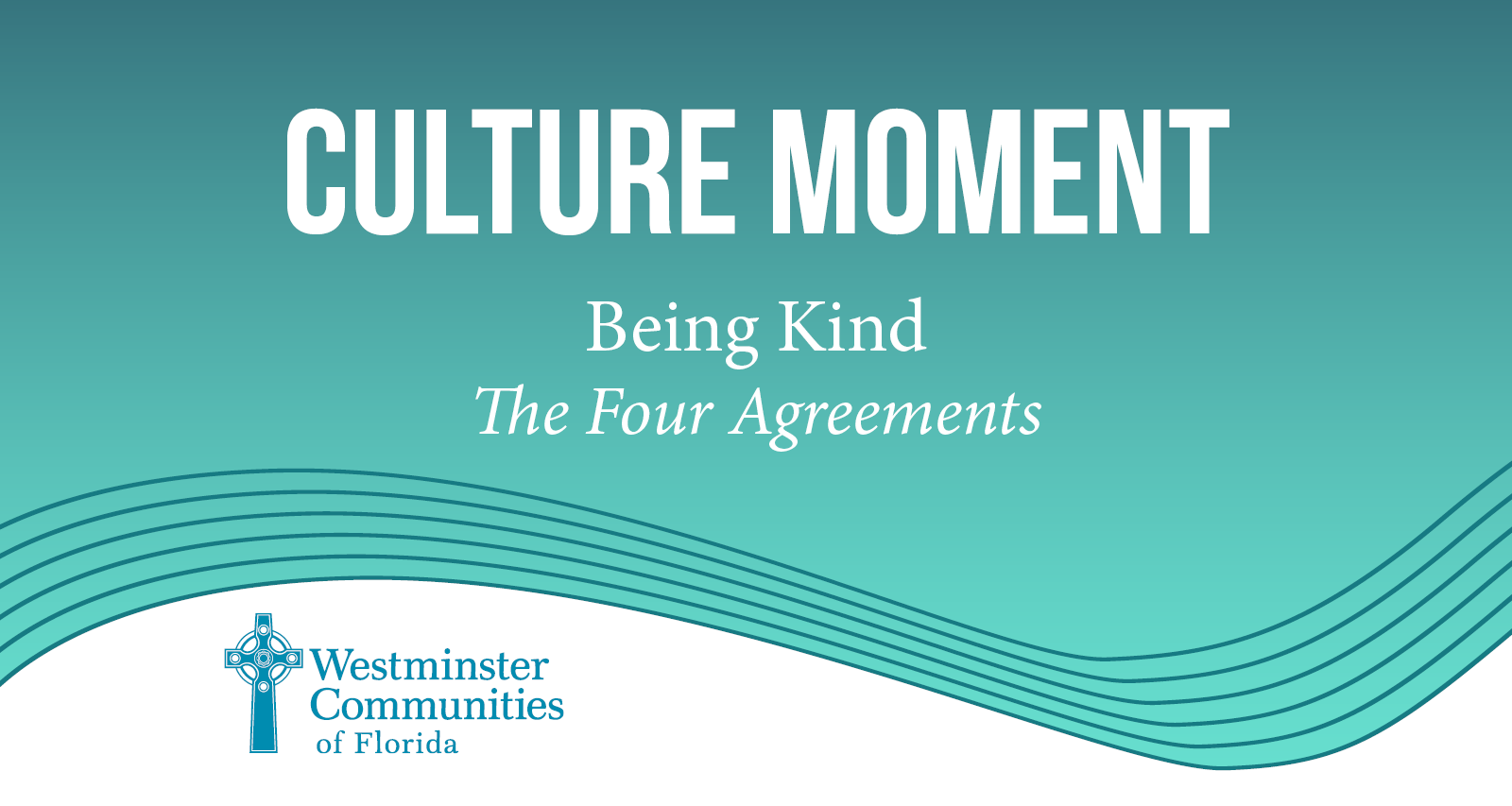Each week, the team members of Westminster Communities of Florida celebrate a Culture Moment, with monthly themes led by Amanda Birch, Director of Culture and Mission Integration.
June is host to our focus on how we relate with others. The need for sensitivity, tolerance, acceptance, and simple kindness has never been greater than in today’s society. To navigate our focus, we selected the book The Four Agreements to guide us in kindness rituals. This book takes ancient Toltec wisdom and shares how four agreements can be implement it in today’s busy, fast, and ever-changing world to embrace your true and loving self while reframing your beliefs.
Agreement #1: Be Impeccable With Your Word
Speak with integrity. Say only what you mean. Avoid using the word to speak against yourself or to gossip about others. Use the power of your word in the direction of truth and love.
Consider how many times you have gossiped about a co-worker to gain the support of others for your point of view. How many times have you hooked other people’s attention, and spread poison about a co-worker in order to make your opinion right? Your opinion is nothing but your point of view. It is not necessarily true. Your opinion comes from your beliefs and your own ego. We create this poison and spread it to others just so we can feel right about our own point of view. To practice this agreement, reflect on a moment where you shared gossip or negativity about someone in the workplace. How could you have handled that differently?
Agreement #2: Don’t Take Anything Personally
Nothing others do is because of you. What others say and do is a projection of their own reality, their own dream. When you are immune to the opinions and actions of others, you won’t be the victim of needless suffering.
When we take things personally, we feel offended, and our reaction is to defend our beliefs and create conflicts. We make something big out of something so little, because we have the need to be right and make everybody else wrong. We also try hard to be right by giving them our own opinions. In the same way, whatever we feel and do is just a projection of our own personal dream, a reflection of our own agreements. What we say, what we do, and the opinions we have are according to the agreements we have made — and these opinions have nothing to do with others. We have to trust ourselves and choose to believe or not to believe what someone says to us. To practice this agreement, reflect on a moment where you felt personally attacked and became defensive. Drill down into the situation, disregarding the people involved. What do you see and how could you have responded differently?
Agreement #3: Don’t Make Assumptions
Find the courage to ask questions and to express what you really want. Communicate with others as clearly as you can to avoid misunderstandings, sadness, and drama. With just this one agreement, you can completely transform your life.
It is always better to ask questions than to make an assumption, because assumptions set us up for suffering. We have the need to justify everything, to explain and understand everything, in order to feel safe. We have millions of questions that need answers because there are so many things that the reasoning mind cannot explain. It is not important if the answer is correct; just the answer itself makes us feel safe. This is why we make assumptions. We have to be what we are, so we don’t have to present a false image. If you like me the way I am, “Okay, take me.” If you don’t like me the way I am, “Okay, bye-bye. Find someone else.” It may sound harsh, but this kind of communication means the personal agreements we make with others are clear and impeccable. To practice this agreement, reflect on a moment where you provided vague instruction or clarity around what it is you were looking for. What did you get in return and how could you have communicated differently?
Agreement #4: Always Do Your Best
Your best is going to change from moment to moment. It will be different when you are healthy as opposed to sick. Under any circumstances, simply do your best, and you will avoid self-judgment, self-abuse, and regret.
Just do your best — in any circumstance in your life. If you always do your best there is no way you can judge yourself. And if you don’t judge yourself there is no way you are going to suffer from guilt, blame, and self-punishment. When you always do your best, you take action. Doing your best is taking the action because you love it and want to do it, not because you’re expecting a reward or trying to please other people. You know you’re doing your best when you are enjoying the action or doing it in a way that will not have negative repercussions for you. When you are doing your best just for the pleasure of doing it, you are taking action because you enjoy the action. You can only be you when you do your best. When you don’t do your best you are denying yourself the right to be you. That’s a seed that you should nurture in your mind. You don’t need the acceptance of others. You express your own divinity by being alive and by loving yourself and others. To practice this agreement, reflect on a moment where you did not feel like you were at your “best”. What did you discover? Were you attempting to please someone else? Did you feel good about the end result? What would you do differently in the future?
To learn more about our team member culture, and how a Westminster career may be right for you, read more on our Careers page!


